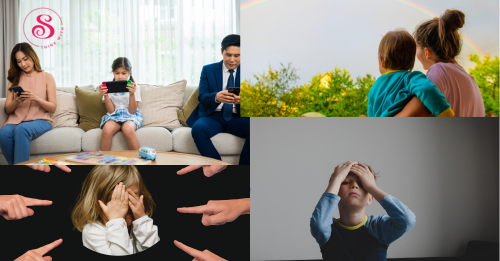The family environment and upbringing play a crucial role in shaping our belief systems. Here’s an explanation of how this occurs:
Modeling and Observational Learning
Children learn by observing and imitating their parents and family members. They adopt beliefs and behaviors based on what they see and experience within their family. For example, if parents exhibit strong religious beliefs, children are likely to adopt similar beliefs as they grow up.
Value Transmission
Families pass down cultural, religious, and moral values from one generation to another. These values are often ingrained in family traditions, rituals, and daily practices. Children internalize these values and incorporate them into their belief systems.
Emotional Influence
Emotional experiences within the family have a significant impact on belief formation. Positive emotional experiences, such as love, care, and support, can instill beliefs related to trust, empathy, and positive relationships. Conversely, negative emotional experiences, such as abuse or neglect, can shape beliefs related to mistrust or low self-esteem.
Parental Guidance and Teaching
Parents play a vital role in providing guidance, teaching, and shaping their children’s beliefs. They often communicate their own perspectives, beliefs, and ideologies to their children, which strongly influence the development of the child’s belief system.
Family Norms and Expectations
Each family has its own set of norms, rules, and expectations that guide behavior and shape beliefs. Children learn what is acceptable or appropriate within their family context, and these beliefs can persist into adulthood.
Family Discussions and Conversations
Engaging in conversations, debates, and discussions within the family can expose children to diverse perspectives and encourage critical thinking. This can contribute to the development of more nuanced and flexible belief systems.
It’s important to note that while the family environment has a significant impact on belief formation, individuals can also develop their own beliefs through personal experiences, education, and exposure to external influences. Belief systems can evolve and change as individuals grow, gain new knowledge, and engage with the wider world beyond their family.
Impact on marriage and parenting style
These belief systems are carried by people throughout their lives and impact their marriage and life as parents too. Family norms and expectations play a pivotal role in marriage by influencing the dynamics, expectations, and behaviors within the marital relationship. Here’s an explanation of their impact:
- Role Expectations: Family norms often dictate gender roles and expectations within a marriage. These norms may influence beliefs about the division of household responsibilities, decision-making authority, and career aspirations. For example, if a family has traditional gender roles, they may expect the husband to be the primary breadwinner and the wife to assume domestic responsibilities.
- Communication Styles: Family norms shape the communication patterns observed within the family unit. The communication style learned in the family may influence how individuals express their needs, resolve conflicts, or handle emotional situations in their own marriages. For instance, if a family values open and direct communication, individuals may carry those communication skills into their marital relationships.
- Conflict Resolution: Family norms and experiences influence how individuals perceive and handle conflicts within a marriage. Observing conflict resolution strategies within their own families can shape their approach to resolving conflicts in their own relationships. Families that encourage healthy communication and negotiation skills may contribute to effective conflict resolution in marriages.
Also Read Unraveling the Complex Relationship Dynamics: Mother in Law, Daughter, and Daughter in Law - Expectations of Support: Family norms influence expectations regarding emotional, practical, and financial support within a marriage. These expectations may include beliefs about caregiving, financial contributions, or providing emotional support to one another. For instance, if a family places a high value on emotional support, individuals may carry those expectations into their marriages.
- Cultural and Religious Traditions: Cultural or religious beliefs and practices can have a significant impact on family norms. These traditions often dictate marriage rituals, expectations of marital fidelity, parenting practices, and more. Cultural or religious norms may guide individuals’ choices and behaviors within their marriages.
It’s important to note that individuals may carry both positive and negative aspects of family norms and expectations into their own marriages. Awareness and open communication about these influences can help couples navigate potential conflicts and align their expectations. Additionally, individuals and couples have the opportunity to establish their own unique set of beliefs and expectations within their marriage, independent of their family’s norms, as they work together to build a fulfilling and healthy relationship.

